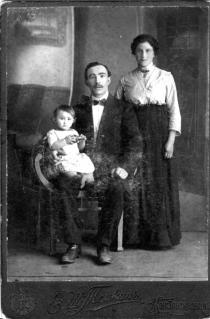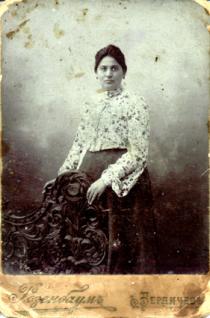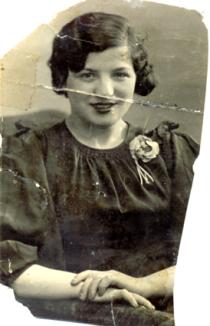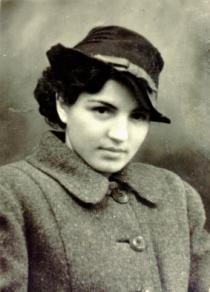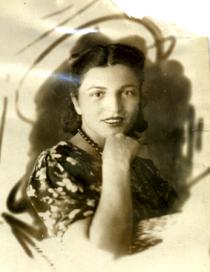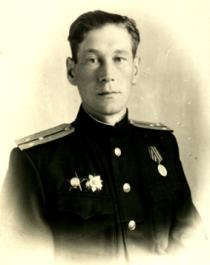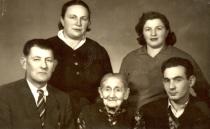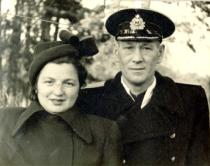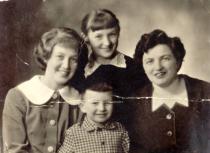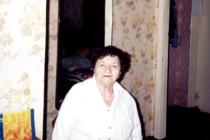This is me, Frieda Rudometova (nee Ladinzon). This photo was taken in Kiev in 1936 before my first vacation. I was going to visit my father in the Crimea, my grandfather in Murafa and had this photo taken to give them copies for the memory.
I Frieda Ladinzon, was born on 17 June 1919 in Murafa, a small Jewish town in Vinnitsa region. In early 1920 my parents, my grandmother and grandfather Ladinzons and my father's brothers left the house and all their belongings to move for Kiev escaping from pogroms.
Our family was very poor and if it hadn't been for my uncle Abram's support we wouldn't have survived the famine in the 1920s. My father didn't have a job. I remember that one time he unloaded buns in the private bakery in the yard of our house. I often came to the bakery and occasionally I got a hot bun - this was a delicacy.
My sister was born in 1924. She was named Yelizaveta, everybody called her Lisa. After Lisa was born, and her delivery had complications, my mother became weird. She could sit idly staring into one point for hours. She didn't cook. She happened to suffer from schizophrenia from her teens, but it was kept a secret from my father, but he would have never married her had he known. My mother had to stay in mental hospital for long periods. My father and I visited her on Sundays.
I went to the Russian school in 1927. There were many Jewish children in my class. I had Russian, Ukrainian and Jewish friends. We got along well and I never heard ay abusive words against Jews from my classmates. The teachers also made no segregation among us. As for me, they were particularly sympathetic. During the famine in Ukraine in the early 1930s our family was probably in a more miserable situation than the others. In summer 1932 my father moved to his sister in Balaklava (a town near Sevastopol). He explained that he wanted to find a good job there to support us better, but when I grew up I realized that just left my mother; he got tired of her disease, fault-finding and of the misery of life. He probably intended to support us, but he couldn’t find a decent job there. It was hard for my mother to raise the two of us and I went to live with grandmother Pesia. I liked it more with my grandmother, she was very kind to me.
Despite difficult circumstances, I was a cheerful and pretty girl. I studied well at school and took an active part in Pioneer and Komsomol activities: I mainly helped those who had problems with their studies. I also participated in preparations to the school meetings dedicated to anniversaries of the October revolution and 1 May. I liked going to parades with my classmates.
I finished my 7th form in 1935. I could continue my studies, but I knew I had to go to work to support my mother. I worked as a courier and then went to the school in the Central Committee. I completed my secondary education. When they asked me what profession I wanted to study I almost pronounced that I wanted to be a cook. I was always hungry and my strongest desire was to eat my fill, but I was ashamed to say it and said that I wanted to be a telephone operator. I finished a course of few months and began to work as a telephone operator in the communications department of the central committee. These were the happiest years in my life. I knew all party leaders they were great people and they treated me, a poor Jewish girl so well giving me an opportunity to study. I received food coupons, garment and shoe coupons. I gained some weight, grew prettier and made many friends. My close friend Lenochka, the daughter of a frontier colonel, and I often went to walk on the Dnieper slopes where there was a brass orchestra playing. I loved dancing and often went to the dancing ground. We believed in communist ideas and credibility of everything happening in our great country.

